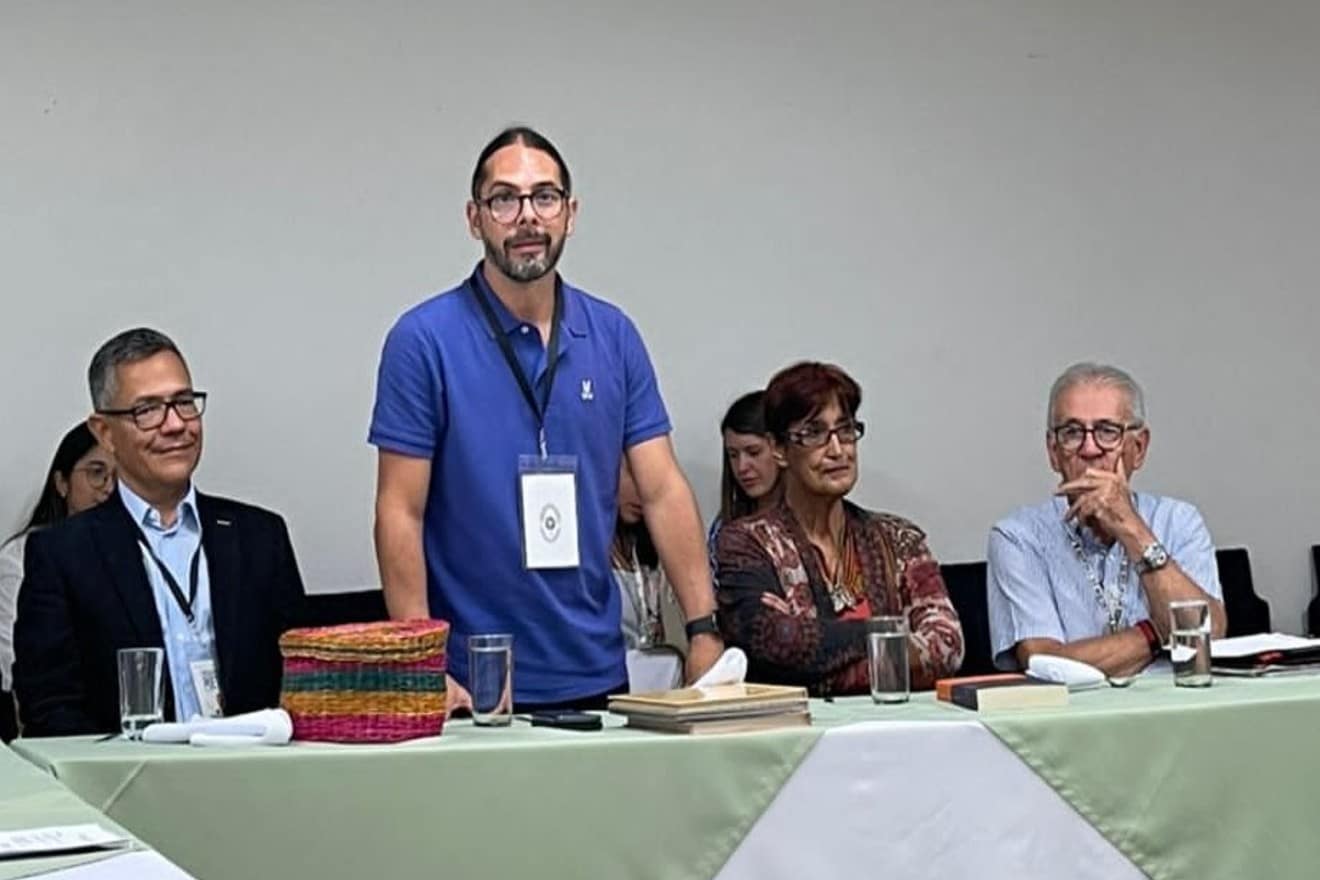
(From left to right) Venezuelan Minister for Culture Ernesto Villegas, Minister for Information Freddy Náñez, Colimbian Minister for Culture Patricia Ariza and the Mayor of Cúcuta Jairo Yánez. Photo: Correo del Orinoco.

Orinoco Tribune – News and opinion pieces about Venezuela and beyond
From Venezuela and made by Venezuelan Chavistas

(From left to right) Venezuelan Minister for Culture Ernesto Villegas, Minister for Information Freddy Náñez, Colimbian Minister for Culture Patricia Ariza and the Mayor of Cúcuta Jairo Yánez. Photo: Correo del Orinoco.
A delegation of officials from Venezuela, consisting of the Minister for Communications and Information Freddy Ñáñez, Minister for Culture Ernesto Villegas, and the Táchira state Governor Freddy Bernal, arrived on Saturday, September 17 in Cúcuta, Colombia, to participate in the Binational Meeting of Poets from Venezuela and Colombia for Peace. They went to Colombia through the Simón Bolívar Bridge border crossing.
It is the first time that Venezuelan ministers are visiting Colombia since Gustavo Petro took office on August 7, and diplomatic relations were resumed. His predecessor, Iván Duque, did not recognize Venezuelan President Nicolás Maduro and instead supported the fake “interim government” of Juan Guaidó, who used Colombian territory to organize several attempts to overthrow the legitimate government of Venezuela, with the blessing of Duque, which led to a breakdown in relations between the two countries.
“We arrived at the border with Minister Freddy Ñáñez and Governor Freddy Bernal to go to Cúcuta, heading for the Binational Meeting of Poets from Venezuela and Colombia,” Minister Villegas wrote on his Twitter account. “We are anticipating the opening of the doors of the border with poetry. I feel very happy as a poet and as minister of culture, to be part of this great day of integration between two countries that can never again be divided.”
In statements broadcasted by Venezolana de Televisión (VTV), the minister said that “poets and artists are the sensitive vanguard of societies, and therefore it is not surprising that poets are the protagonists of this first stage of a new era of strong exchange.”
This slideshow requires JavaScript.
“Those who bet on disintegration failed!” continued Villegas. “And now we are going for the victory of peace, of brotherhood, integration, poetry, culture. For those binational families that characterize us, for those Colombians who dance the Venezuelan joropo and those Venezuelans who eat a paisa dish.”
Minister Freddy Ñáñez said, “This shows the will for integration in all senses: commercial, cultural, scientific, social. And from there, to build from the singularities of each country, the things that we can do in common at this time, when the world deserves gestures of peace and harmony, demonstrating that differences are what make the world friendly and habitable. That is why poets are taking this first step, they are the prelude to what is going to happen in the coming days.”
After the first meeting, the authorities of both nations met at a binational welcome event in which were present the Colombian Minister of Culture Patricia Ariza, the Mayor of Cúcuta Jairo Yáñez, and 20 poets and personalities from the literary scene of the two countries.
Washington Again Threatens Venezuela with Sanctions: President Maduro Couldn’t Care Less
“Poetry is what always opens the doors of the spirit,” said the Colombian Minister of Culture and playwright Patricia Ariza, who said she was deeply moved by the event.
“One of the most important issues for the Ministry of Culture [of Colombia] is cultural integration with Latin America and the Caribbean, with the whole world, with all countries, because culture is indestructible,” she said. She also added that Venezuela and Colombia share thousands of kilometers of borders, the sea, the mountains and a common history. “I hope this relationship never deteriorates again.”
Declaraciones de la Ministra de Cultura colombiana Patricia Ariza en el encuentro binacional de poetas. @VillegasPoljak @NicolasMaduro pic.twitter.com/TxhZbEGV6J
— Yepfri Arguello (@arguelloyepfri) September 17, 2022
Minister Villegas shared a video of the historic moment in which the Venezuelan ministers crossed the border from Venezuela to Colombia through the Simón Bolívar Bridge.
Minister Freddy Ñáñez, a Táchira native, explained that he had not crossed the border into Colombia since 2003, when he attended a Colombian-Venezuelan poetry recital in Cúcuta. He went on to talk about the year the poets Tirso Vegas and Edwin López were assassinated, and the paramilitary forces were positioned in Cúcuta, issuing manifestos threatening Venezuelans who supposedly “disguised themselves as people of culture to—according to them—work with the guerrillas.”
Así arribamos a la frontera con el VP Freddy Ñáñez y el Gob Freddy Bernal para pasar hacia #Cúcuta, rumbo al Encuentro Binacional de Poetas de #Venezuela y #Colombia. #FelizSábado#17Sep pic.twitter.com/eSLoA555sT
— Ernesto Villegas Poljak (@VillegasPoljak) September 17, 2022
In another video shared by Minister Villegas, Táchira Governor Freddy Bernal explained how the border crossing works at the Simón Bolívar Bridge, and how it will change after the opening of the border, scheduled for September 26. “Three years ago it was a chimera, a few years ago it was a dream, and now we are a few days away from the opening of the border becoming a reality. The dream of Bolívar and our people is fulfilled. Culture continues to unite us!” Bernal said on video.
Así llegamos al Puente Internacional Simón Bolívar con el VP Freddy Ñáñez y el Gob Freddy Bernal para pasar hacia #Cúcuta, rumbo al Encuentro Binacional de Poetas de #Venezuela y #Colombia. #FelizSábado#17Sep pic.twitter.com/I7Iggnu7wX
— Ernesto Villegas Poljak (@VillegasPoljak) September 17, 2022
The Binational Meeting of Poets from Venezuela and Colombia is taking place during September 17-18, in Cúcuta, Colombia, and San Cristóbal, Táchira (Venezuela). Ten Venezuelan and ten Colombian poets are participating in this event. On Sunday the event will continue in San Cristóbal, the capital of Táchira state.
Translation: Orinoco Tribune
OT/JRE/SC
You must be logged in to post a comment.